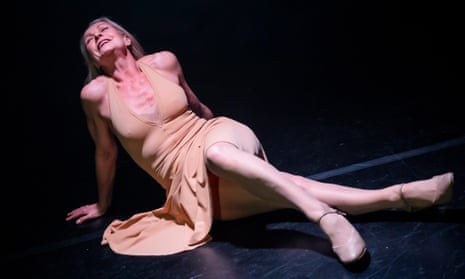This solo musical opens with a sex scene. A woman (Andrée Bernard) is pushed up against a closet by her lover. There is talk of taut flesh, unblemished skin and wrought muscle. And we return to this peak of passion against the closet, followed by the bathtub, time and again. But in between is a workaday relationship history that takes us from teen romance to a series of inappropriate partners, internet dates and a reliable-but-dull dentist. There are men who sweep the woman off her feet and others who reject her. You could call it a kind of sexual quest, in theory.
In practice, it is hard to work out what this bizarre show is saying. If the intention is to take a dive into the travails of modern love from a female perspective, it comes back up with cliches. Also written by Bernard, the romantic highs are so trite that they might be rehashed from the pages of a Mills & Boon novel (the erotic series) and the rest of the material is barely there.
Directed by Michael Strassen, Bernard plays an actor struggling to get parts. Her story is set to nine songs and the production seems to aspire to a West End musical sound and look. Bernard sings about love, sex, romance, desire and break-ups while twirling, shimmying and flick-kicking. There are lyrics like “When god gives you lemons, you reach for the gin” mixed in with romantic angst. They are set to Chorus Line moves, which leaves Lucie Pankhurst’s jarring choreography overexposed on an empty stage.
Bernard plays the men that her unnamed narrator meets with a deepening of the voice and a gruff, half-cockney accent. Her agent, Chumley, appears as a caricature, leg cocked, an invisible cigarette in hand. There are briefly dramatised scenes of her acting work, often involving skimpy dresses and sleazy creatives, but these #MeToo elements are not given enough due.
We hop from one romance to another, the narrator in thrall to men referred to in Carry Bradshaw epithets such as the “Tall American” and “Fabulous Photographer”. “I’m a romanta-holic” she says. She certainly is – life outside the orbit of men is barely touched on and there is little interiority beyond a yearning for romantic love.
The titled brackets over ‘is’ suggests a play about the modern complexities of womanhood. There is one mention of a pronoun in passing, by Chumley, in jest. This character is more old-school than that: she likes to be called “babe” and orders dessert at a restaurant as a statement of empowerment. It might be an honest presentation of a romantic journey but it seems frustratingly unreflective.
